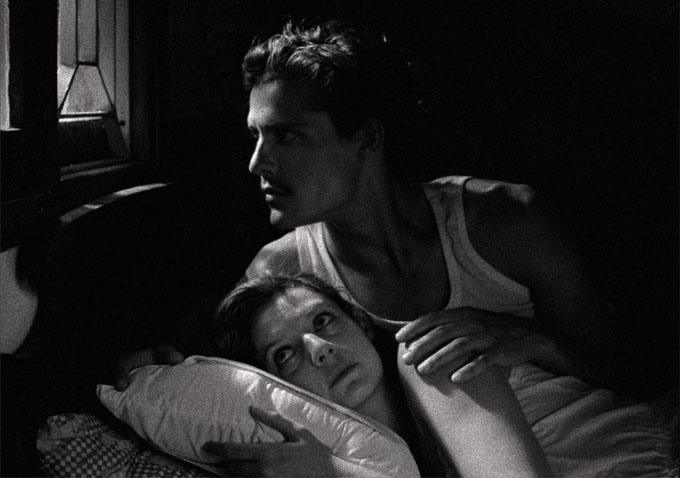
"Tabu" (dir. Miguel Gomes, 2012)
Gomes' Berlin Film Festival sensation is an evocative, lyrical two-chapter love story separated by decades and continents that transcends what initially seems to be nothing more than an experiment in style over substance. Beginning in modern day-ish Lisbon, we are introduced to Aurora, an old woman mentally and physical deteriorating, in an equally frightening and hilarious performance by Laura Soveral. On her death bed, Aurora mentions a lover's name which is written off by two companions (her maid and an empathetic neighbour) as nonsense but, upon discovery of this man's actual existence and his arrival to the hospital, the film transports into a dreamy, fairytale-like flashback to the pair's African-set romance that audaciously couples the existing black and white, 4:3 and 16mm photography with a world where there's little-to-no spoken dialogue and narrated by Gian Luca (Carlotta Cotta with v.o. by Gomes himself) — a character abrutly introduced only seconds before.
It's a bold and sudden move that pays off handsomely as the slow-burning romance draws audiences in with an almost Malick-like teaming of beautiful images and passive narration as Gian Luca details the inescapable magnetism between him and Aurora — who, at this point, is the young, pregnant wife of a tea-farmer living in Colonial Africa. That's not to say the film wholly succeeds, though: the drama is intercut with a litter of oddities in the script that are entertaining but bafflingly out of place (recurring crocodiles, corny musical performances) with the final reel feeling a little over-indulgent. The charm Gomes brings to the core story, though, keeps it engrossing throughout, patricularly with the wonderous, illuminating aesthetics. [B+]
 "War Witch" (dir. Kim Nguyen, 2011)
"War Witch" (dir. Kim Nguyen, 2011)
With the issue of child soldiers in Africa a hot topic courtesy of the whole KONY debacle earlier this year, this writer was fairly cautious walking into "War Witch," a film with said issue as a central theme from Canadian filmmaker Kim Nguyen. There was little to fear, though, with the harrowing, bleak tale sparing all sentimentality, centering on a 12 year old protagonist Komona as she is forced to kill her parents, initiated in and left with no choice but to adapt to life as a rebel soldier all within the first moments of the film.
Rather than meandering on this harsh reality and hamming up the cruelty, the issue of child soldier is simply a catalyst from here on in for what grows into a spiritual, redemptive coming-of-age journey for our lead as she faces the consequences not just of her actions but of her time and place. Framed throughout by Komona's reading of a letter to her unborn child, our lead is haunted by ghosts on the battle field and manages to escape death due to their appearances quickly earning her the titular "war witch" moniker and the army's respect. To emphasise the films ability to avoid preaching, our lead is actually treated fairly well by her fellow soldiers with the army's leader, the Great Tiger (Mizinga Mwinga), depicted as charismatic and gentle around her. Eventually growing tired of the lifestyle, Komona manages to escapes the rebel army with a fellow soldier as the movie falls into some heart-warming, comedic and humanistic moments before they are returned back to the truths of their society.
Thanks to the documentary style shooting and amateur actors in leading roles, the film is able to bring a stark realism to the issue with lead Rachel Mwanza remarkably fearless (she won the Best Actress award in Berlin) as is her albino soldier love interest, played by Serge Kanyinda. Traditional African music and chanting is littered throughout the pic offering audiences glimpses into a world so foreign, most would be inclined to write off as unnatural. This is also evidenced by violence in the film which is depicted with great speed, brutality and with value placed on a human life. Harrowing and unforgiving, the film offers so much more than a film about child soldiers, growing into a study of childhood and the loss of innocence in an war-ridden African nation. [B]

